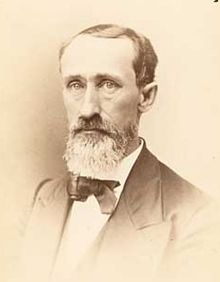| Francis R. E. Cornell | |
|---|---|
 Cornell c. 1875 Cornell c. 1875 | |
| Associate Justice of the Minnesota Supreme Court | |
| In office January 11, 1875 – May 23, 1881 | |
| 4th Attorney General of Minnesota | |
| In office January 10, 1868 – January 9, 1874 | |
| Preceded by | William J. Colvill |
| Succeeded by | George P. Wilson |
| Member of the Minnesota House of Representatives from the 5th district | |
| In office 1861–1862, 1865 | |
| Member of the New York State Senate from the 26th district | |
| In office January 1, 1852 – December 31, 1853 | |
| Preceded by | William J. Gilbert |
| Succeeded by | Andrew B. Dickinson |
| Personal details | |
| Born | Francis Russell Edward Cornell (1821-11-17)November 17, 1821 Coventry, New York, U.S. |
| Died | May 23, 1881(1881-05-23) (aged 59) Minneapolis, Minnesota, U.S. |
| Alma mater | Union College |
| Occupation | Politician, lawyer, judge |
Francis Russell Edward Cornell (November 17, 1821 – May 23, 1881) was an American lawyer, politician, and judge.
Biography
Cornell was born in 1821 in Coventry in Chenango County, New York. He graduated from Union College in 1842 where he had been a member of The Kappa Alpha Society and studied law before being admitted to the bar in 1845. A lawyer in Addison in Steuben County, he represented the 26th District in the New York State Senate from 1852 to 1853.
Cornell moved to Minneapolis, Minnesota, in 1854. Cornell served in the Minnesota House of Representatives from District 5 from 1861 to 1862 and in 1865. Cornell was elected Minnesota Attorney General in 1867 and was reelected twice, serving three terms from January 10, 1868, to January 9, 1874. Cornell was elected associate justice of the Minnesota Supreme Court in November 1874 and served from January 11, 1875, until his death on May 23, 1881, in Minneapolis.
Legacy
In an article in Minnesota Law & Politics, Cornell was named as one of the "100 most influential attorneys in state history." He was noted as a pioneering trial lawyer who "established his reputation litigating the land claims that arose out of the opening of the government reservation that occupied most of the west side of the Mississippi River at the time" and as an active abolitionist who successfully argued for the freedom of a slave woman who had been brought north to accompany her owner on a visit.
Notes
- Minnesota State Law Library-Francis R. E. Cornell Archived 2014-01-05 at the Wayback Machine
- Minnesota Legislators Past and Present-F.R.E. Cornell
- Minnesota's Legal Hall of Fame
| New York State Senate | ||
|---|---|---|
| Preceded byWilliam J. Gilbert | New York State Senate 26th District 1852–1853 |
Succeeded byAndrew B. Dickinson |
| Political offices | ||
| Preceded byWilliam J. Colvill | Minnesota Attorney General 1868–1874 |
Succeeded byGeorge P. Wilson |
| Attorneys general of Minnesota | ||
|---|---|---|
- 1821 births
- 1881 deaths
- Cornell family
- Politicians from Minneapolis
- People from Addison, New York
- People from Coventry, New York
- Justices of the Minnesota Supreme Court
- Minnesota attorneys general
- New York (state) state senators
- Members of the Minnesota House of Representatives
- Lawyers from Minneapolis
- 19th-century members of the New York State Legislature
- 19th-century members of the Minnesota Legislature